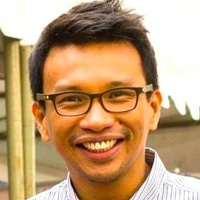
He has been criticized tremendously but Manny Pacquiao does not back down. That's what happens when you have a religious individual with the tenacity of an athlete joining the Senate.
Many people might not want Manny in the Senate. But here's the incontrovertible truth: he won a seat and he represents the conservative worldview of many Filipinos. He has been criticized for his statements on homosexuality, Jennifer Laude, cross-dressing, and the death penalty.
But he presses on, precisely because Manny Pacquiao's statements resonate with the conservative worldview of many Filipinos. That worldview, however, is implicit and that is what makes it more treacherous.
To prove my point: There are prominent LGBT figures in the entertainment industry and their flamboyance makes us laugh. But when they show up in our household, we tame them. And when it is our children who are involved, we punish them. And when someone is killed for being a transgender, we think it is justified.
Fundamentalism
Manny Pacquiao can continue to preach not just because he reads the Bible everyday. He can get away with his Bible-thumping speeches because he has a captive audience. These are the people who think that their conservative worldview on gender and the death penalty is justified because it is the law of God.
Forget the fact that many Filipinos do not read the Bible. The point is that they are implicitly convinced that the Bible supports their convictions. Even those who don't own a Bible will readily say that God created Adam and Eve, not Adam and Steve.
It is in this light that there is a close connection between fundamentalist religiosity and intolerance.
Fundamentalism has a long religious history especially in Christianity. But it has become increasingly associated with extremism and a literalist view of the Scriptures. In other words, fundamentalists take many of the statements of the Bible at face value.
This is not a new development in the Philippines. In the 1990s, my colleague, Dr Ricardo Abad, documented a notable shift in the attitude of Filipinos toward the Bible. In 1991, a national survey showed that 55% of Filipinos agreed that "the Bible is the actual word of God, and it has to be taken literally word for word." The figure went up to 72% in 1998. The most recent data shows that it was 75% in 2008.
Our predominantly Catholic society is, in other words, fundamentalist.
This is why Manny Pacquiao has a captive audience. He can quote Bible verses to support the death penalty and argue that those who engage in homosexual acts are "worse than animals" (http://www.rappler.com/thought-leaders/122778-religion-bigotry-pacquiao).
Manny is not the enemy
Inasmuch as many of us are irritated at Manny Pacquiao for using the Bible in the Senate, the reality is that he is not the enemy here. Pacquiao simply articulates the fundamentalism of Filipinos, many of whom are not aware of the complexity of Biblical interpretation and progressive theological thinking.
What we should find problematic is that Manny Pacquiao's fundamentalist message seems to resonate with his wider audience. This situation calls for incisive conversations on our deeply held assumptions as a people.
There are, for one, apparent moral contradictions and they need to be confronted. How can we, for example, talk about mercy and compassion when Pope Francis was here and a year or so later entertain the need for the death penalty?
It is for this reason that discussion among religious individuals, regardless of faith tradition, must be opened up. People must not draw back from respectful religious conversations.
Otherwise, our public sphere will be hijacked by only one interpretation, which in effect disregards the depth of reflections other religious individuals and traditions might be able to offer.
Some people have also criticized Manny Pacquiao for being too religious in the Senate. But given the inherent religiosity of Philippine society, there is no way that religion can be completely banned from legislative speech and ordinary talk.
And it must not be, especially because religion also has intelligent contributions to offer.
But there is a caveat, what political philosophers call "mutual accountability." Individuals like Manny Pacquiao can draw from their religious convictions to advance issues they find important. They must, however, be willing to respond to objections based on reasons generally acceptable to people who may not share the same faith. Secular values to which they need to appeal include equality and the right to life.
In the final analysis, Manny Pacquiao's use of the Bible is not inherently problematic. A democratic space must be able to welcome different perspectives.
To me though the bigger controversy has to do with the quality of conversations shaping the future of our society. When individuals rely on their religious worldview as the sole basis of truth and wisdom, it creates enemies more than it builds bridges.
It is at this point that we need to be reminded of what our Constitutions says: We, the sovereign Filipino people, are to "build a just and humane society." – Rappler.com
Jayeel Serrano Cornelio, PhD is a sociologist of religion and the director of the Development Studies Program, Ateneo de Manila University. He is the author of Being Catholic in the Contemporary Philippines: Young People Reinterpreting Religion (Routledge, 2016) and one of the authors of Introduction to World Religions and Belief Systems, a Senior High School worktext published by Rex. Twitter: @jayeel_cornelio